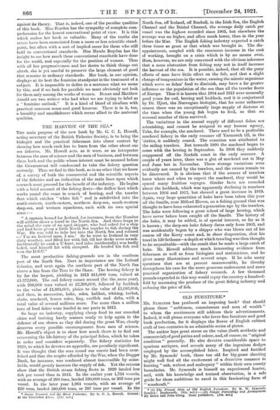OLD FURNITURE.*
Mx. SYuOxDs has produced an imposing books that should please those " noblemen, connoisseurs and men of wealth " to whom the auctioneers still address their advertisements. Indeed, it will please everyone who loves fine furniture and good book production, for it displays the flower of English cabinet craft of two centuries in an admirable series of plates.
The author lays great stress on the value (both aesthetic and commercial) of good patina and colour, and, of course, on " original condition " generally. He also devotes considerable space to spurious antiques, and reveals many of the ingenious dodges employed by the accomplished faker. Inspired and fortified by Mr. Symonds' book, those too old for big-game shooting might well find all the excitement of a detective romance in hunting " oak, walnut and mahogany " within their own county boundaries. Mr. Symonds is himself an experienced hunter, and, with his knowledge and trained observation, is a safe guide for those ambitious to excel in this fascinating form of " woodcraft."
• (1) The Present State of Old English Furniture. By H. W. Symonds. London : Duckworth. [63s. net.]—(2) Simple Furnishing and Arrangement. By Helen and John Gloag. Same publishers. [10s. net.] Simple Furnishing and Arrangement, by Helen and John Gloag,2 is a less ambitious book. The average young couple: about to set up in a small- house or flat would find its advice worth seeking, as the authors' suggestions do not imply more than moderato means. A number of simple colour schemes are proposed and a wide choice of inexpensive furniture, both modem and antique, is given in the illustrations. Thesauthors point out how much may be done to beautify by the mere elimination of the ugly. Was it not William Morris who said : " Have nothing in your house that you do not know to be useful or believe to be beautiful" ? That is still a hard saying for most of us. Some day, perhaps, we may bring ourselves to offer up on the bonfire each 5th of November the chief guy amongst our possessions—the ugliest or most useless thing within our gates. More bonfires and fewer jumble sales would certainly make the world more habitable. The authors clearly agree. They quote Mr. H. G. Wells as saying : " A large number of homes deserve to be burnt, most modern furniture, an over- whelming majority of pictures and books ; . . . one might go on for some time with the list." One might.



































 Previous page
Previous page